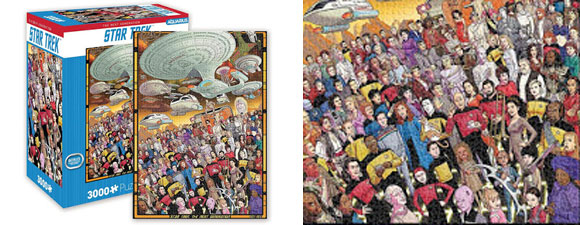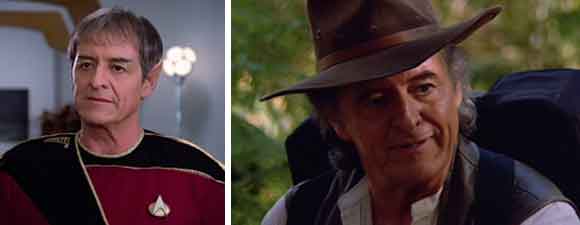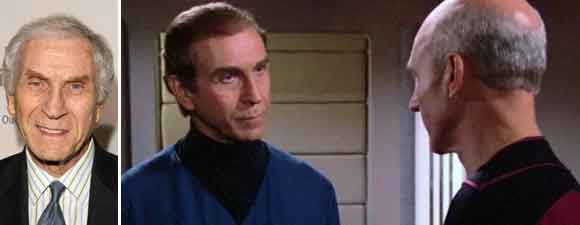Retro Review: New Ground
6 min readAfter Worf’s human mother brings his son Alexander on board, insisting that she can no longer raise the boy, Worf seeks Troi’s help in helping him fit in.
Plot Summary: En route to a planet whose leading scientists have developed a new form or propulsion called a Soliton Wave, the Enterprise receives a visit from Worf’s mother and son. Mrs. Rozhenko explains that Alexander has been having trouble at school and she thinks he needs to be with his father, since Worf’s parents are no longer young enough to keep up with a Klingon child. Worf agrees to keep Alexander on the Enterprise for the time being, but when the boy steals a small model of a lizard and lies about it, he becomes furious, lecturing Alexander about honor and threatening to send him to a strict Klingon school. Troi suggests that Alexander probably felt abandoned by Worf when he was sent to live on Earth and is feeling even more deserted now that Worf wants to send him away again. Meanwhile, the Enterprise participates in the Soliton Wave test, but though initial results are promising, the wave proves to be much more powerful and dangerous than anticipated, putting a Federation colony at risk. While the crew takes the ship into the wave to try to disperse it, Alexander hides in a biolab where a pair of rare Corvan Gilvos are being kept during transport to an animal preserve. A fire breaks out in the lab, threatening the boy, who insists that Riker save the Gilvos when Worf comes to rescue his son. Realizing that he would regret sending Alexander away, Worf invites him to live on the Enterprise.
Analysis: The first time I saw “New Ground,” I thought it needed a stronger scientific A story and a tighter, more witty B story. There are so many parenting stories both within Star Trek and in pop culture in general, and there isn’t a great deal that’s original in this one – it may be about Klingons rather than humans, but Alexander reacts very much like a human boy, and Worf very much like a human parent faced with unexpected sole custody. Still, watching it again, I find that I like it much better than I remembered. This is probably in large part because I watched it with my own children, and my younger son, the environmentalist, was as concerned about the Gilvos as Alexander. Considering that I can’t sit through half the action movies currently made because they’re so gratuitously violent, with even the good guys shooting right and left, it’s really lovely to watch a show where it’s taken for granted that the first officer will risk his life to save a rare species of non-sentient alien. And even though it’s completely predictable that Worf will agree to let Alexander stay – I could figure out that much the first time I saw it – I find it less annoying now to sit in on Troi’s counseling sessions with Worf and Worf’s arguments with Alexander than I did last time, though I still think they should feel less talky.
The biggest problem with “New Ground” is that the scientific plot is mired in technobabble. We get only glimpses of the Solaton Wave, no real understanding of how it works or why it’s a preferable alternative to warp drive, nor do we have any investment in the people who have invented it, since both the lead scientist and his species are newcomers to Star Trek (and their distinguishing characteristics, as happens to often, are interesting facial wrinkles rather than some truly unique aspect of their society or culture). LaForge provides the hype for the scientific test by comparing it to getting to see Chuck Yeager break the sound barrier or Zefram Cochrane discover warp drive, but it’s hard not to feel like Worf at the start of the episode and roll one’s eyes at the hyperbole (which, predictably, goes wrong at the earliest possible opportunity). Even though the ship is supposed to take off at warp speed after the new wave, Picard also keeps asking Worf about the new roster of security personnel about to arrive – from where, one wonders, if they weren’t on the transport that conveniently allowed Worf’s mother to bring his son to him just as the ship is about to test an unpredictable technology in a part of space that ends up not being remote enough for safety?
It’s hard not to appreciate Helena Rozhenko, who circumvents a long-distance argument with Worf simply by showing up with Alexander – maybe she believes that, once Worf sees his son, he will want to keep him near, but what’s clear is that she wishes Worf to take responsibility for Alexander with as little fuss as possible. Worf knows better than to argue with his mother; he doesn’t try to persuade her to try again with Alexander after giving his son a stern talking-to, merely assures her that he will figure out another option. Yet Worf has no idea how to talk to his son; it’s understandable that he would not bring up K’Ehleyr and the things she might have taught Alexander about being a Klingon, given that K’Ehleyr is still a very sore subject for Worf himself, but one would think he’d talk to the boy about the common values the Rozhenkos must have taught their Klingon son and grandson, and about the problems Worf experienced himself as a Klingon growing up among humans. This would have given the writers lots of opportunity to tell us things about Worf’s youth that we don’t know in place of the long, talky therapy sessions with Troi, which aren’t a bad idea in theory but which really start to feel like Afterschool Special lectures. It’s much more interesting to watch Worf try to learn to parent than to hear him talk about it in theory; I love the moment where Worf enters the holodeck while Alexander is testing out his calisthenics program and silently cheers his son on, even though he arrived to scold him.
The woman cast as the Enterprise teacher is a terrible choice; she has no dynamic range, sounds exactly the same cajoling and attempting to discipline Alexander, and as a result it’s somewhat understandable that any spirited child (let alone a Klingon) would defy her. We don’t get to see him interact with her alone, nor do we get to see him interact with other children, leading to even more instances of our being told what’s going on instead of being allowed to watch it develop. Maybe instead of a more compelling scientific story, the episode would have done better to jettison the Soliton Wave storyline altogether except to create the crisis at the end that causes Worf to realize how keenly he would feel the loss of Alexander; since it never becomes a big issue later when the Federation is considering banning high warp speeds to stop space from ripping, it’s obvious in hindsight that it’s mostly irrelevant tech. That would leave more time to see Alexander meeting other people on the Enterprise and finding out how children with busy parents are integrated into the community. I like so many little moments – Picard excusing Worf from a meeting after the third interruption related to Alexander’s arrival, Troi’s hesitation when Worf confidently announces that Alexander will never lie again – but the episode drags on the whole, as much as I might want to praise it. My son believes more attention to the Gilvos would have improved the story…maybe he’s right.






